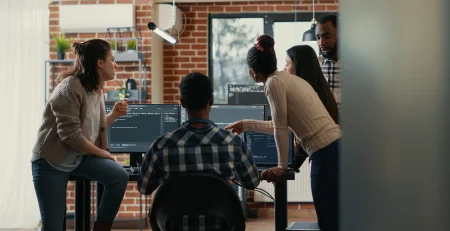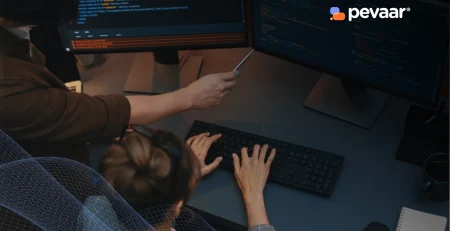How to Effectively Hire a Dedicated Software Development Team
Hiring a dedicated software development team can be a game-changer for your project’s success, offering specialized expertise and focused attention to meet your unique needs. This guide provides CTOs with a comprehensive roadmap on how to effectively hire a dedicated software development team, covering everything from understanding the benefits to navigating the hiring process and managing your team for optimal results.
Table of Contents:
- Understanding the Role of a Dedicated Development Team.
- When to Consider Hiring a Dedicated Development Team.
- Steps to Hire a Dedicated Software Development Team.
- Managing a Dedicated Software Development Team.
- Common Challenges and How to Overcome Them.
- Conclusion.
- FAQs.
Understanding the Role of a Dedicated Development Team
What is a Dedicated Software Development Team?
A dedicated software development team is a group of professionals solely focused on working on your project. Unlike freelancers or a mix of part-time developers, this team operates as an extension of your company, committed to your goals and deadlines. They provide a cohesive, integrated approach to software development, ensuring that all members are aligned with your business objectives.
Benefits of Hiring a Dedicated Development Team
Opting for a dedicated development team comes with multiple advantages. It offers a higher level of commitment and specialization, leading to increased efficiency and a deeper understanding of your project. This team model also provides flexibility, as you can scale the team size up or down depending on your project’s needs. Additionally, it ensures continuity and consistency throughout the development process, reducing the risk of miscommunication and errors.
When to Consider Hiring a Dedicated Development Team
Projects that Benefit from Dedicated Teams
Not every project requires a dedicated team, but for large-scale, long-term projects, this model is highly beneficial. Complex software development tasks, ongoing maintenance, or projects that require continuous updates and enhancements are ideal candidates for a dedicated team. For startups aiming to launch a new product or enterprises that need to modernize their legacy systems, a dedicated team ensures focused attention and tailored solutions.
Assessing Your Project’s Needs
Before deciding to hire a dedicated team, it’s essential to evaluate your project requirements. Consider the scope of work, the duration of the project, and the specific expertise needed. If your project demands specialized skills that are not available in-house or if you anticipate that the workload will be consistent and intensive, a dedicated team might be the best solution.
Steps to Hire a Dedicated Software Development Team
Define Your Project Requirements
Before reaching out to potential vendors, clearly define what you need from the project.
Technical Requirements
Outline the specific technologies, platforms, and programming languages your project will utilize. Detail any technical challenges you anticipate, so the development team can address them upfront.
Business Objectives
Beyond technical details, articulate your business goals. What problem is your software solving? How does it fit into your overall business strategy? Understanding these objectives will help the team align their work with your broader company vision.
Budget Planning and Cost Consideration
Budget is a critical factor in hiring a dedicated development team. Determine how much you are willing to spend and consider the potential return on investment (ROI). Keep in mind that while cost-saving is essential, quality should not be compromised. Balancing cost with expertise will help you get the best value from your investment.
Research and Shortlist Potential Vendors
Once your project requirements and budget are clear, begin researching potential vendors.
Evaluating Vendor Expertise
Look for vendors with a proven track record in your industry. Assess their technical expertise, the quality of their previous projects, and their ability to deliver within deadlines.
Checking References and Portfolios
Always check references and review portfolios. Talking to past clients can provide insights into the vendor’s reliability, communication skills, and problem-solving abilities. A strong portfolio with successful case studies is a good indicator of a vendor’s capability.
Conducting Interviews and Assessments
Narrow down your list of vendors and proceed with interviews.
Technical Interviews
Technical interviews should focus on the team’s proficiency in the required technologies and their approach to solving potential challenges. Assess their problem-solving skills, coding standards, and familiarity with your project’s technical requirements.
Cultural Fit
Cultural alignment is just as important as technical expertise. Ensure that the team’s working style, values, and communication preferences align with your company’s culture. A good cultural fit enhances collaboration and reduces friction during the project.
Finalizing the Contract
Once you’ve selected a vendor, it’s time to formalize the partnership.
Legal Considerations
Ensure that the contract covers all legal aspects, including intellectual property rights, confidentiality agreements, and non-compete clauses. This protects your interests and prevents future disputes.
Payment Terms and Milestones
Agree on payment terms and project milestones. Break the project down into phases, with payments tied to the successful completion of each phase. This approach minimizes risk and keeps the project on track.
Managing a Dedicated Software Development Team
Communication Strategies
Effective communication is key to managing a dedicated development team. Establish regular check-ins, use collaborative tools, and maintain an open line of communication. This keeps everyone on the same page and helps address issues promptly.
Setting Expectations and Milestones
Clearly define your expectations from the start. Set realistic milestones and ensure that the team understands the project’s goals and deadlines. This alignment is crucial for timely and successful project completion.
Ensuring Continuous Collaboration
Foster a collaborative environment where ideas are freely shared and feedback is encouraged. Regular reviews and updates will ensure that the project stays on course and meets your expectations.
Common Challenges and How to Overcome Them
Time Zone Differences
Working with a dedicated team in a different time zone can be challenging. To mitigate this, establish overlapping work hours for real-time communication. Use project management tools to track progress and maintain transparency.
Maintaining Quality Control
Quality should never be compromised. Regular code reviews, testing, and performance monitoring are essential to maintaining high standards throughout the development process. Consider hiring a quality assurance (QA) team if needed.
Managing Team Dynamics
Team dynamics can make or break a project. Ensure that the team is well-coordinated and that any interpersonal issues are addressed swiftly. A positive team environment boosts productivity and morale.
Conclusion
Hiring a dedicated software development team can significantly enhance the success of your project, especially for complex and long-term initiatives. By carefully selecting the right team, setting clear expectations, and maintaining effective communication, you can ensure that your project is delivered on time, within budget, and to the highest quality standards.
FAQs
- What is the difference between a dedicated team and an in-house team?
A dedicated team is an external group of professionals focused solely on your project, while an in-house team is made up of employees who work within your company. Dedicated teams offer flexibility and specialized expertise, whereas in-house teams may have a broader understanding of your company culture. - How long does it take to hire a dedicated development team?
The hiring process can vary, but it generally takes a few weeks to a few months. This timeframe includes defining project requirements, researching vendors, conducting interviews, and finalizing contracts. - What are the risks of hiring a dedicated development team?
Risks include potential communication challenges, time zone differences, and the possibility of the team not meeting your expectations. These can be mitigated by thorough vetting, clear communication, and setting realistic milestones. - How can I ensure my project stays on budget with a dedicated team?
To stay on budget, clearly define the scope of work and set a realistic budget at the outset. Regularly monitor expenses and adjust the project scope if necessary. Establishing payment milestones tied to project phases also helps manage costs. - What are the key skills to look for in a dedicated development team?
Look for technical expertise in the required technologies, problem-solving skills, strong communication abilities, and a good cultural fit with your company. Experience in your industry or similar projects is also a valuable asset.
If you’re looking for a reliable and highly skilled dedicated software development team, Pevaar is your ideal partner. With extensive experience in staff augmentation and nearshore IT solutions, Pevaar provides expert developers proficient in HTML, WordPress, JavaScript, and other cutting-edge technologies. Our team seamlessly integrates with your business, ensuring high-quality deliverables and a smooth development process. Whether you’re a startup or an enterprise, Pevaar helps you scale efficiently, reduce time-to-market, and optimize your software development efforts. Get in touch with us today to build your high-performing development team












Leave a Reply